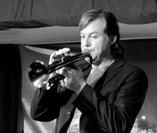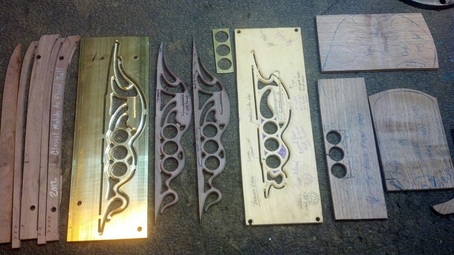 Bravura Flugelhorn research & development Bravura Flugelhorn research & development I sat down this morning to write my latest blog entry and came across Jake's latest entry Infinite Finish Lines that hit home on exactly what I have been thinking as I build trumpets this weekend. My interpretation of Jake's blog is simple, musicians need not limit themselves as the essence of life is found within the process of growing musically and throughout all aspects of life. You may take a minute to read his blog as the following is my commentary on his entry... "That sacred feeling of accomplishment, understanding and communication that musicians feel when they believe they have reached a certain level of proficiency is universal among all people. This is especially true of Jazz and Classical musicians who often believe that they are in fact special "talented" and/or "gifted" people based on their personal development on their instrument(s). In reality, pretty much all people have the same potential to succeed in just about anything including Jazz music. What defines us as acceptable, good or even great musicians is our own individual "integral code" by which we live, listen, learn and express. There are many words spoken today that attempt to describe or pinpoint this "integral code" such as integrity, soul, musicality, intuition, expression, nuance, intimacy, drive, life, experience, synergy, energy, vibrancy, genius, etc. But at the end of the day, the common denominator is more accurately expressed as "choices". We each make choices narrowing down our options until we choose to do one thing over another. We CHOOSE to love music, to love our instrument, to love our work and to love our friends, neighbors, family and the stranger passing you on the street. Everything we do in life involves some choice. We can even choose to hold our breath and end it all in vanity, yet all of you reading this have chosen to breath and live another day. So what is the source for the ever-present depression and cynicism among great musicians? Choice! Like everything in life, some of us choose to believe that the reality of life, music, politics or whatever is the right way and the only way. THIS IS THE SOURCE OF DEPRESSION. Expecting everything in life to go the way you had imagined is counter intuitive to reality. Our world is filled with billions of people and infinite possibilities so why do we CHOOSE to believe there is only one way? You're onto the key ingredient to life Jake. Life is about learning, growing, stretching beyond our limits, trying new things every day and becoming more experienced gaining an ever-growing body of perspective. We have it as good or as bad as our understanding of good and bad. (Most of us have it pretty damn good if we only gain perspective)" How does all of this relate to my weekend of building horns in solitude? Well I'm glad you asked. I was reflecting on my life since the time I began holding a trumpet in fifth grade. I say holding the trumpet rather than playing it as I didn't take the time to learn to play trumpet for over six years. I literally held it and pressed my best guess at a valve combination and blew to hopefully get close to the required note in rehearsals. I was that kid that was always one note behind rhythmically while playing the wrong note! The day I began taking trumpet seriously, I practiced four continuous hours. Within two years, I had a very defined vision of who and what I would become as a musician on trumpet. In my mind, I was going to become a classical virtuoso playing all the best venues around the world. My fans would travel any distance to see and hear my technically acrobatic unmatched musically genius, or so I thought. Yes, I had visions of grandeur that no one could diminish. And for years I believed that it could and would all come true because I knew I had the drive, devotion, intelligence, integrity, passion and commitment necessary to succeed. I worked hard throughout college as a trumpet performance major continuing my 4-hour daily practice routine. Competition at St Olaf College was serious business in the music department as this school attracts and produces an extremely high percentage of great musicians every year. Just keeping up with all the other kids was a major undertaking considering I only had one year of trumpet lessons under my belt. I worked hard to overcome embouchure problems, ear training, even serious medical issues all the while keeping my eye on the ball. I believed that the key to being successful was never giving up and always working hard to reach my goals. Then reality stepped in and my dreams were shattered. At least that's how many young musicians think of their lack of accomplishments. I personally have never seen anything I've worked hard to achieve as a failure or shattered dream. I don't see how having a self-inflicting negative attitude is productive, necessary or enjoyable. Yet I meet a lot of young (and a fair number of older) people today who either believe they are extra special (and therefore better than others) or down and out because the world is not currently acknowledging their unique talent(s) and/or genius. Some of these people have in fact been recipients of prestigious awards after recording albums while others are completely unknown to the public. Regardless of age or accomplishment, they share self-pity, frustration and cynicism. Before I continue, let me make it clear that the vast majority of musicians I encounter and work with are very positive, happy, well-rounded and productive people. So please do not think I see this as an epidemic problem. More likely, this attitude plagues the newest generation of players coming into our new world of instant communication, instant information, instant sound and video and instant gratification. I am thankful to have been raised for so many years living on the road with my parents, AM radio, 8-tracks and singing. I dropped out of college in my senior year and pursued building trumpets. Everyone thought I was crazy to want to build trumpets, but I simply saw this as the natural evolution of my vision. I reasoned that I was older, more experienced and with my new perspective I saw that there was more to music than being a virtuosic star. I wanted to become more than a musician. I yearned for a deeper understanding of music, which is essentially artistic communication. Throughout college, I became obsessed with three subjects outside of music; psychology, physics and biology. It seemed strange at the time that other kids knew exactly what they wanted to do with their lives. My friends would state that they were studying pre-med with the next steps being grad school, residency, then happiness. Okay, the "happiness" part wasn't spoken, but it was always implied as the natural result of having a master plan. Most of my friends were going to become lawyers, doctors, scientists, professors and concert musicians. And most of them achieved their goals. I didn't have a master plan. In fact, I didn't even know I was going to college. I applied to attend St. Olaf College against the will of my parents and my high school guidance counselor. My counselor refused to write a recommendation for me and pleaded that I consider a small state school. He didn't know anything about me as the first time I ever met with him was when I asked for the recommendation. He took a look at my attendance history and grades and pretty much told me to get lost. I applied to college without him and had a glowing recommendation from my band director who saw my great potential. Gary Tangen was my high school band director and he was much like my Dad in that they both pushed me extremely hard to understand and the concept of "Cause and Effect". Neither of them ever labeled their teachings as such and, like all great teachers, the essence of their lessons was always aimed at this basic principle. Everything in this world exists in its current state as the result of some action or inaction. The Cause and Effect principle is so very simple, so universal and very often completely ignored in our society. Mr. Tangen would demand excellence at all times just like my Dad. There are many ways to achieve excellence or something closely resembling a really good job and it was expected of me to discover my options to produce real tangible results. If you've read my past blog entries or attended one of my master classes, then you may recall the time I challenged the best player in band and moved from 13th chair to first chair in less than five minutes. After I won first chair that day, Mr. Tangen saw my potential and took me seriously. He moved me to the top band a month later and I sat 3rd chair in the Symphonic and Jazz bands the following year. The first and second chairs were occupied by guys who had 7 years of private lessons senior to my 6 weeks of practice and zero lessons. Mr. Tangen told me to sign up for study hall with him during 3rd hour the following semester. I didn't know why he wanted me to do this, but I didn't question him and signed up. The first day of "study hall", I walked into the band room and he said, "Go warm up the band, I'm going to the lounge to get some coffee." After he walked out of the room, I was suddenly hit with the reality of the situation. He just told me to go into the band room, which I could see through the large office window, to conduct warm-ups with the kids in the band, the kids who were my peers just a few short months ago. This was my first experience rising to a leadership position within a group of peers and I recall picking up the baton, demanding silence followed by fifteen minutes of warm-ups and exercises. Everyone did exactly as I asked almost as if I was the regular teacher and not a student. This was an eye-opening experience, one of many similar leadership situations that Mr. Tangen and my Father put me through time and time again. I am forever grateful for the opportunities I have been given to hopefully succeed when the possibility of failure was clearly evident. With risk comes the potential for growth, understanding, perspective and wisdom. What did I learn from that day? I had never directed a band before, nor did anyone even give me the slightest hint that I may need this skill. It was literally forced upon me unexpectedly when I was 16 years old with no guidance or supervision. I learned that putting yourself into a new unknown situation is a great opportunity for success, which basically the opposite of what educational institutions preach. They tell you that you must study long and hard with your nose in a book and your butt in a chair to absorb tokens of wisdom, rules of the game and such before you ever set foot in your profession. Hogwash! (I love that word) How in the world did the very first band director ever stand up in front of a group of musicians and accomplish anything if there were no classes available to learn his subject matter? There's only one logical explanation, he got up there and figured it out all by himself. Cause and Effect is within everything we think, everything we do, everything everyone does everywhere. I also discovered that day what it means to gain perspective. The previous year, I was sitting 13th chair in that band and couldn't play an Eb as I had not learned my trumpet fingerings. Now I was directing the band's warm-ups a few days a week and was looking for kids who didn't know their scales. I would pick them out right there in front of everyone and work on the notes they missed. I could easily hear wrong notes since I was previously an expert in this area. Perspective is everything. I could now see that making music was not about individuals, but rather the culmination of every musician's efforts coinciding within the patterns of the prearranged architecture we refer to as musical compositions. A band is the perfect example of Synergy, or synchronous energy and effort that produces something greater than each individual's contribution. Perspective, Synergy, Leadership, Cause & Effect...all in one day. Getting back to my original story... Much to the surprise of my friends and family, I was accepted to St. Olaf and headed to college when I was seventeen. This was probably the first obvious point in my history that shouted to the world, "I do not have a master plan!" Unlike my peers in school, my plan was to live life and experience everything possible while achieving excellence and maybe even some small piece of success with others, rather than all on my own. Making decisions based on circumstances in the moment has led me all over the world. By embracing the moment and seeing opportunity where others fearfully imagine failure, I have been gaining experience, perspective and understanding in everything I do for my entire life. Music has been an integral part of my existence as it is for most humans around the globe. But there has never been room for selfish narrow expectations of society to accept my music by my own definitions. And this, I believe, is where the latest generation of musicians has been misinformed. Despite all of society's efforts to shower young people with praise and positive energy in hopes that they would grow up to push human potential even further in the direction of perfection, I regularly encounter young people "suffering" boredom, depression, lack of motivation and entitlement issues. This is where I pick up from last week's blog entry. Choice is a choice. It sounds silly until you think about it. You choose to consciously take responsibility for your attitude or you don't. It is your choice to decide to make decisions. In other words, we all have the luxury of choosing how we react to our current circumstances. Further, we all could hold ourselves accountable for our present state of mind, body, finances, career, happiness, etc. as these are all the result of our choices. Or it could be said that we are responsible for our own Cause and Effect. Two very wise men taught me that choice is a choice that not all people choose. Choose wisely my friends, for your love of life depends on it! So why is there a photo of the Bravura Flugelhorn stages of development? Because the choices I have made in my lifetime led me from wanting to be a trumpet virtuoso to discovering that there is so much more to life than simply playing a musical instrument really well. Every aspect of life on this planet holds the potential for growth that you believe is only possible with music. How else can you explain why mathematicians become lifelong lovers of equations or why biologists risk their own lives to discover new species deep in the jungles of the Amazon? The human experience is potentially the greatest experience in your life.
2 Comments
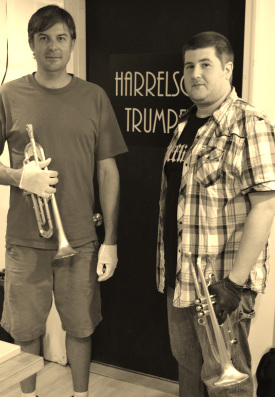 It is probably no surprise to you that I play the trumpet. In reality, I eat, sleep, breath, drink and dream trumpet while doing my very best to maintain a healthy balanced life. I personally have become one with this instrument in more ways than I can articulate. What was once the most difficult, frustrating and sometimes disappointing aspect of my life, trumpet, is now one of my better strengths. You see, I was the world's worst trumpet player for many years. In fact, I sat 13th chair in my high school band at the beginning of eleventh grade. I was so bad that I literally sat next to the door that exited the band room. My placement by the door was symbolic and reflective of my effort. I loved the sound of band rehearsals...thick sonorous textures, resonant upper overtones fluttering in the air while solid harmonies pressed against my chest. I was hooked on rehearsals, but my home life at the time was more about family and learning stability than about school work or band. We had moved all over the country up until I started fifth grade, living with numerous relatives in cities and states scattered around the United States and living in the semi truck. My parents were truck drivers and we didn't stop moving! So what changed? Well, everything once I decided to begin practicing the trumpet! But that is a very long story that I will save for another blog entry. Today, you only need to know that I began taking trumpet seriously when I was 16 and here I am today serving you, the brass musicians of the 21st century. My weaknesses on trumpet have been replaced with knowledge, experience, an understanding of science, psychology and self control. Trumpet is now one of my greatest strengths and I work hard every day to increase my musical and technical growth on the world's most difficult instrument. The real question today is, "How do I stay in shape on trumpet?" when I have so many other things to do. Clients visit my shop from all over the world on a regular basis and they have a reasonable expectation that I can and will demonstrate my techniques, theories and instruments proficiently. Unlike a trumpet factory that relies on generations of manufacturing and reputation, I take full responsibility for my instrument designs, Standing Wave Efficiency technology, Aperture control theory (my physics-based brand of understanding the embouchure), manufacturing, assembly, finishing, repair, sales, service, etc. In short, I do everything at Harrelson Trumpets. And though HT is made up of the entire Harrelson Trumpets family with James Soh and Jake assisting on finishing a prep work, James Knabe on the road showing horns and educating clients, Christine and Jen promoting and working with clients via phone, email, facebook and such, in the end I do all of these things on a daily basis. This leaves little time for practice. In fact, there is rarely more than one or two hours available per month for practice. So how do I stay in shape? By not practicing! Jake has mentioned more than once that I do not warm up as if this is an anomaly. However, I have heard there are others who do not warm up and someday hope to meet one or two of you. I don't practice either. Instead, every time I pick up a trumpet, I imagine what I want to play and become one with the horn. There is no reason any of us cannot start the day on any note. My first note of the day is always a surprise as I like to be spontaneous. Why do the same thing twice when we learn faster by creating new challenges. I usually start on a different note every day. I have about a 50% chance of starting my day on a note above the staff since half of my range is above the staff. With that said, I may start on a note in the bass clef as I play the entire bass trombone range daily. The only exception is when I have a problem with something specific. For instance, last summer I recall having difficulty playing my "B" on one of my Bb trumpets. Then I became obsessed with this note playing everything imaginable while always beginning and ending on B in any octave. I think I drove everyone nuts that week as I would play all of my B's again and again...below the staff, an octave lower, two octaves below the staff, above the staff, in the staff, double B, triple B, below the staff again, odd variations of whole tone intervals, then more B's in various octaves. It was therapeutic and I haven't missed a B ever since. In essence, I practice when I am testing trumpets or between machining jobs when something is cutting loudly in the background or in the two minutes everyone is getting ready to leave for lunch. I do in fact practice all the time, but it never looks like practicing. There is no regular place and time designated for learning at HT. I learn on the fly all the time. This environment is designed for growth, movement and innovation. I practice while cutting, sanding, soldering, eating, driving, sleeping etc. When I hear Jake, Christine or any of our visitors play something I want to learn, I remember it immediately and work it out long before I ever touch one of the many trumpets scattered about the shop. I know what I want to play before I ever play it at least half of the time. The rest of the time is usually free improvisation trying things I have never done or heard. I play A LOT of things I have never heard. When someone tells you that everything has already been done on trumpet (or anything), please smile and thank them for the advice. Then remember these words... "There is always More to learn the YOU can ever imagine!" Trust me, I have attempted to do the math and the number of possibilities for growth within the confines of the human reality is staggering. We are not physically capable of IMAGINING the full capacity of our own individual potential. Consider the following: - Isaac Newton (born in 1642) IMAGINED Einstein's theory of general relativity and photoelectric quantum physics almost two centuries BEFORE Albert Einstein provided a mathematical explanation. - Johann Sebastian Bach (born in 1685) CREATED hundreds of musical works that essentially define the majority of 20th century Jazz harmony and improvisation. - Radio waves, Micro waves, Ultrasonic waves, Trumpet Sound waves and Light waves are essentially variations of the same thing. All of these mediums are used for ALL communications in the known universe uniting all living beings within the energy web seen and unseen. - The human body has been fighting (and winning) against every known type of disease and ailment for thousands of years before anyone ever discovered the source of any disease known to man. - The earliest rendition of Standing Wave Efficiency was likely the most crucial concern when creating the first "brass" instruments as these evolved from horns and wooden instruments, the majority of which have not survived in physical form. - The largest commercial passenger aircraft in production today, the Dreamliner, was inspired by the aerodynamics of a living bird that has been testing physics for thousands of years. It seems obvious that flying birds were the inspiration for human flight in the beginning, but after 110 years of flight we look to nature for solutions. - Thomas Edison's most popular and successful invention was not the light bulb. Ironically, he didn't really understand the physics involved in creating this innovation. However, he did personally invent the screw type base for the light bulb which is the most popular in use even today. - Nikola Tesla (born in 1856) was rudely dismissed and publicly shamed repeatedly by none other than the "Greatest Inventor in the World" aka Thomas Edison. Despite Edison's jealous attempts, Tesla's true genius brought us the standard Induction Motor and Alternating Current electrical transmission systems in use throughout the US and world today. What you imagine today may or may not become physical reality in your lifetime. What you imagine on trumpet this very second may or may not become sonic reality today. Both are partially your decision within reason. I find that most people who bring their ideas to fruition begin with simple ideas, growing a library of small pieces of success that are later assembled into larger visions of innovation. Transcribe any Louis Armstrong solo and you will find that he was primarily outlining chords in the form of inverted arpeggios and following the melody while coloring with chromaticism. So why then do we consider him a genius and one of the fathers of Jazz Music? Because he mastered small pieces and assembled them into beautifully complex rhythmically compelling strings of sonic expression. So you want to design the next high efficiency car that runs on water? Or become the next John Coltrane? Go do it, one small imagined piece at a time! You could achieve your own seemingly impossible goals while doing other things necessary to life today. I learned to build and play trumpets throughout my entire life of realities including my time spent as a waiter, fork lift driver, police officer, Grand Canyon tour guide, dish washer, carpet installer, janitor, school teacher, woodworker, caterer, cook, security officer, student, graphic artist, machinist, auto mechanic, etc. I simply keep my eyes open and question everything in our world so that I have a better understanding of how and why our physical, social and psychological systems work together to produce success. You are potentially your best teacher, it is your choice to question, learn, repeat and apply. 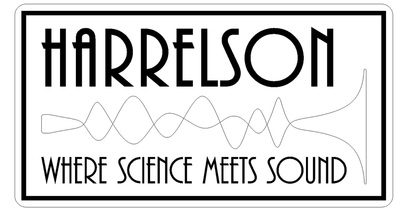 We are beginning production of a new series of videos explaining and demonstrating trumpet-related questions and techniques. The will include the following categories:
Now that Jake Baldwin and Christine Palmer are back with Harrelson Trumpets after finishing up their studies at New England Conservatory and the University of Colorado (Boulder) respectively, we have 3 full time professional trumpet players in the shop at all times! This means that you will soon see and hear us demonstrate a variety of Harrelson trumpets in solo, duo and trio settings. We will also mix in the occasional Bach, Schilke, Benge, Yamaha, Monette, Kanstul, Getzen or whatever horn so you can hear the differences between horns. I firmly believe that every trumpet has advantages, which is why I personally own and play so many different instruments made by so many great manufacturers over the past 150 years. I always come back to my personal Medusa, Summit One and Midnight horns as they are easier to play, much more consistent and very comfortable. But there are times when a Bach or some other horn is the best option for the situation. Like when I'm playing outside in a crowded space and the people behind me need to hear what I'm playing. Keep your eyes open for two new video releases per week and let us know what you hear as we switch around horns in various performance settings. Please send your requests as well. The following are a few of the hundreds of topics we have brainstormed and hope to eventually address in the new video series. 2-Minute Tips
Understanding "____________"
How to "_________"
|
Jason Harrelson
Inventor, Musician, Educator and Founder of Harrelson Trumpets, Trumpet Momentum and Harrelson Momentum. Archives
July 2024
|

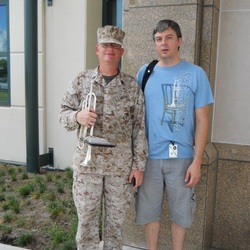
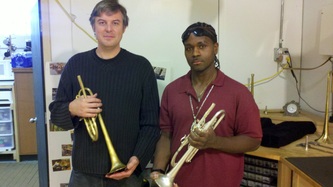
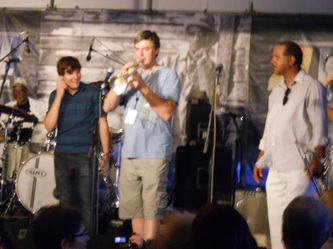
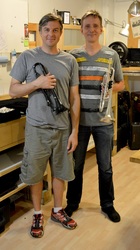
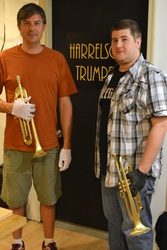
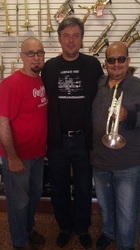
 RSS Feed
RSS Feed
